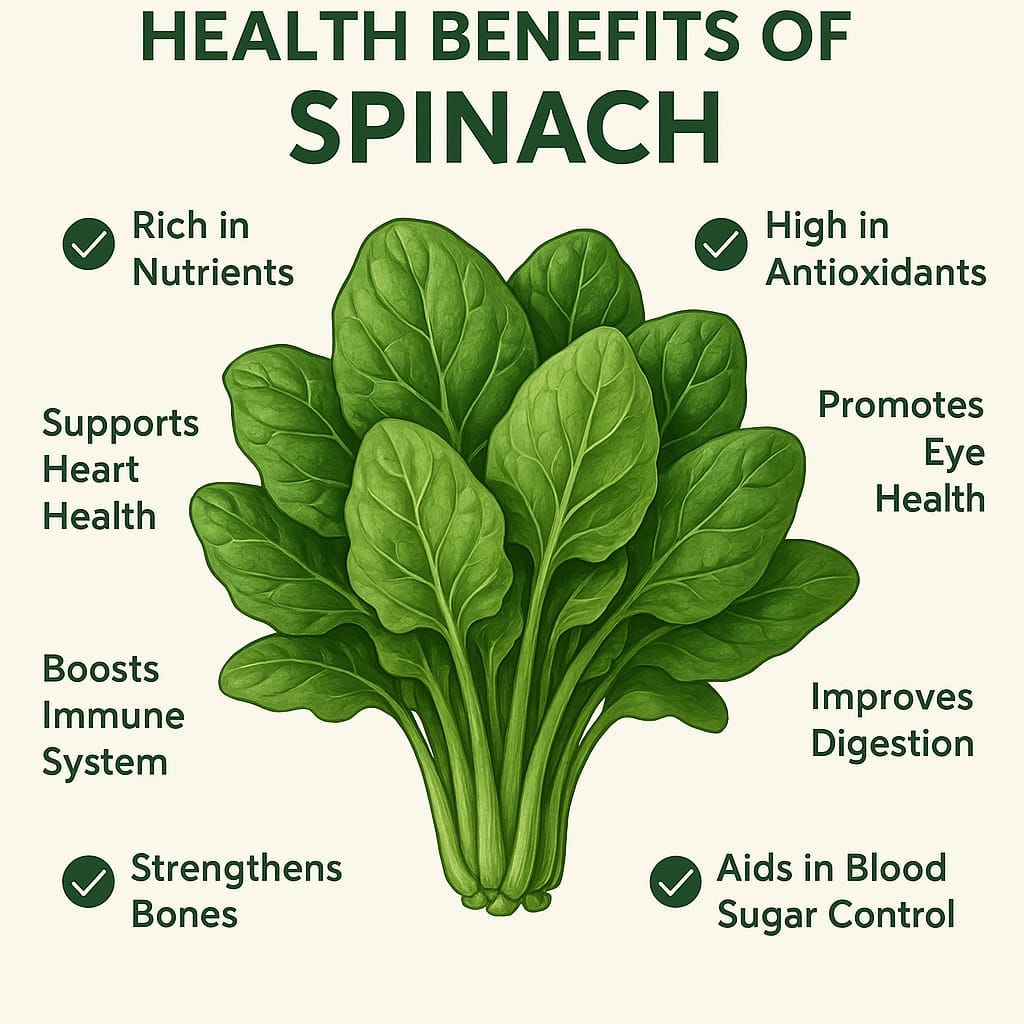Spinach is a leafy green vegetable known for its incredible health benefits. Packed with essential vitamins, minerals, and antioxidants, spinach supports overall well-being and helps prevent various diseases. Whether consumed raw in salads, blended into smoothies, or cooked in meals, spinach is a powerhouse of nutrition.
Nutritional Value of Spinach
Spinach is a low-calorie vegetable rich in vital nutrients. A 100-gram serving of raw spinach contains:
Calories: 23
Protein: 2.9 grams
Fiber: 2.2 grams
Vitamin A: 9377 IU (188% of Daily Value)
Vitamin C: 47% of Daily Value
Vitamin K: 604% of Daily Value
Iron: 2.7 mg (15% of Daily Value)
Calcium: 99 mg (10% of Daily Value)
Magnesium, Potassium, Folate, and Antioxidants
Top Health Benefits of Eating Spinach
- Rich in Antioxidants
Spinach contains powerful antioxidants such as lutein, zeaxanthin, and beta-carotene, which help combat oxidative stress and protect cells from damage.
- Boosts Immunity
The high vitamin C content in spinach strengthens the immune system, helping the body fight infections and diseases more effectively.
- Supports Heart Health
Spinach is rich in nitrates, which help lower blood pressure and improve blood circulation, reducing the risk of heart disease.
- Improves Eye Health
Lutein and zeaxanthin present in spinach promote good vision by protecting the eyes from harmful blue light and reducing the risk of cataracts and age-related macular degeneration.
- Strengthens Bones
With a high vitamin K content, spinach plays a crucial role in bone health by improving calcium absorption and reducing the risk of osteoporosis.
- Aids Digestion
Spinach is high in fiber, which promotes healthy digestion, prevents constipation, and supports gut health.
- Supports Brain Function
The folate and antioxidants in spinach contribute to brain health, improving memory and reducing the risk of neurodegenerative diseases like Alzheimer’s.
- Helps in Weight Management
Being low in calories and high in fiber, spinach keeps you full for longer, reducing cravings and aiding in weight loss.
- Regulates Blood Sugar Levels
Spinach contains alpha-lipoic acid, which helps lower blood sugar levels and improves insulin sensitivity, making it beneficial for diabetics.
- Promotes Healthy Skin and Hair
Vitamin A in spinach helps in maintaining healthy skin, while iron supports hair growth and prevents hair loss.
How to Include Spinach in Your Diet
- Smoothies: Blend fresh spinach with fruits like bananas and berries for a nutritious drink.
- Salads: Mix raw spinach with vegetables, nuts, and dressings for a healthy salad.
- Soups: Add spinach to soups and stews for an extra nutrient boost.
- Stir-Fries: Sauté spinach with garlic and olive oil as a tasty side dish.
- Omelettes and Scrambles: Incorporate spinach into eggs for a protein-packed meal.
Conclusion
Spinach is a superfood loaded with essential nutrients that offer numerous health benefits. Whether you want to improve heart health, boost immunity, or manage weight, adding spinach to your diet is a simple and effective way to enhance overall well-being. Start including spinach in your meals today and enjoy its countless health benefits!
FAQs
Q1: How much spinach should I eat daily?
A: Eating 1-2 cups of fresh spinach or 1/2 cup of cooked spinach daily can provide significant health benefits.
Q2: Can I eat spinach raw?
A: Yes! Raw spinach retains most of its nutrients and can be consumed in salads or smoothies.
Q3: Who should avoid spinach?
A: People with kidney stones or those on blood thinners should consume spinach in moderation due to its high oxalate and vitamin K content.
Q4: Is spinach good for skin and hair?
A: Yes, spinach is rich in vitamin A and iron, which promote healthy skin and hair growth.
By adding spinach to your diet, you take a step towards a healthier and more vibrant life!
🚀 Let’s Connect!
Looking for expert insights on website development, SEO, and online business growth? Connect with me on LinkedIn or reach out via my website!
🔗 Connect on LinkedIn 📩 Contact Me



